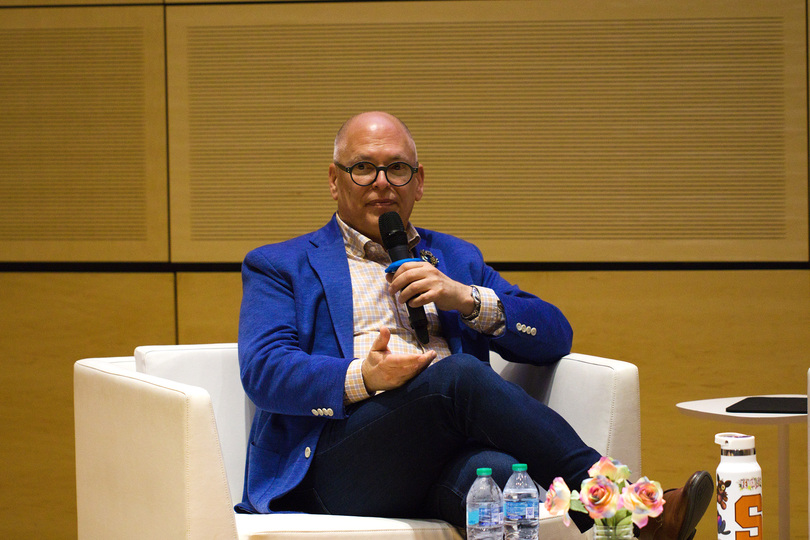10 years later, Jim Obergefell says fight for marriage equality isn’t over

In 2015, Jim Obergefell was the face of the historic landmark case that legalized same-sex marriage in the U.S. On Wednesday, he came to SU to tell students the fight continues, especially as cases challenging the precedent loom. Ashley Glode | Contributing Photographer
Get the latest Syracuse news delivered right to your inbox.
Subscribe to our newsletter here.
In 2015, Jim Obergefell was the face of a landmark Supreme Court case ruling same-sex marriage legal across the United States. A decade later, he told Syracuse University students he’s continuing his fight as SCOTUS plans to rule on Davis v. Ermold next week, which could overturn the historic precedent his case set.
The lead plaintiff in Obergefell v. Hodges, Obergefell spoke to students at the 7th annual Potash Keynote Speaker event Wednesday evening, organized by SU’s LGBTQ+ Resource Center and hosted at the Newhouse School of Public Communications.
In a conversation moderated by Emily Stewart, the LGBTQ+ Resource Center’s director, Obergefell shared stories about his late partner, John Arthur, and advised students on how to engage in LGBTQ+ activism amid targeted attacks at a national level.
Opening the conversation, Obergefell talked about how he met his late husband, John Arthur, back in the 90s, when coming out “wasn’t nearly as easy as it is today.” His husband Arthur was later diagnosed with amyotrophic lateral sclerosis — a terminal nervous system disease — and died in 2013. They were together for 22 years.
In 2013, they decided to get married, but faced challenges living in Ohio at the time. Then, the state enforced a 2004 law exclusively defining marriage as being between a man and a woman.
“It all starts with John,” Obergefell said. “We wanted marriage, but we also both agreed that we wanted marriage in exactly what marriage meant to everyone else. We weren’t willing to do a symbolic ceremony.”
With Arthur’s declining health, Obergefell obtained a Maryland marriage license, which doesn’t require both partners to be present when issuing. He crowdfunded a medical charter flight to bring Arthur there for the ceremony, he said.
But later, when Arthur was in hospice care, Obergefell realized the state of Ohio wouldn’t legally recognize him as his partner’s husband on his death certificate. When he realized Arthur would “die spouseless” in the eyes of the law, something had to change, he said.
Obergefell and his lawyer, Al Gerhardstein, sued the Ohio Department of Health, taking the case to the Supreme Court in 2015. In a 5-4 ruling, banning same-sex marriage was ultimately declared unconstitutional, two years after Arthur died.
Today, Obergefell said the fight isn’t over. On Nov. 7, SCOTUS will hear the case of Kim Davis, a Kentucky judge jailed for six days in 2015 after refusing to grant marriage licenses to same-sex couples.
Obergefell said the case risks “erasing” history, setting back a precedent he fought to set. A ruling in favor of Davis could allow states to constitutionally restrict same-sex marriage.
“I never thought 10 years after the decision I’d be worried about having the right to marry the person you love, no matter what state you live in,” Obergefell said. “And at this point, if I had to go back to the Supreme Court, I would go back.”
While he said he doesn’t think the current federal government will continue its support for marriage equality, Obergefell urges students to support their local LGBTQ+ community.
“What I think is happening today is at the local level, sharing stories, talking with people and getting involved globally,” Obergefell said. “Yes, court decisions are important, passing laws is important, but the way to make sure those lasting changes happen is from the bottom up.”
Obergefell urged students to get involved by following national organizations, to define “their own version” of activism and find the joy of making a small impact.
“When you start getting involved with the organization, you’ll start building a network, a community of the right kind of people,” Obergefell said. “Maybe your version of activism is always reaching out to your elected officials to say, ‘What you’re voting on is wrong, I don’t agree with this.’”
When Stewart asked Obergefell about students finding LGBTQ+ allies in the local community, he said: “Allies are everywhere.” He recalled several from his Supreme Court case, including Ohio Health Director Rick Hodges, who quietly supported him despite representing a state that declared marriage exclusive to a man and a woman.
He also urged students to support the transgender community, people of color and other marginalized members of the LGBTQ+ community, as he said they are facing more attacks on a national level.
“There are a lot of opportunities for our students to be better allies to the people within our community,” Obergefell said. “Racism, misogyny, transphobia, you name it. Those things exist within the queer community, and we need to be better allies for everyone.”
While some students who attended the event said they’ve heard of Obergefell’s case before, they appreciated his willingness to share anecdotes about it and give insight into his personal life.
“I thought his story was really beautiful,” senior Naiya Amin said. “I’ve learned about the case before, but it’s important to humanize the names behind these big cases.”
When sophomore Chloe Brown Monchamp approached Obergefell after the event, she was brought to tears. After seeing the face behind the case that allowed her two dads to become legally married, she couldn’t help but thank him, she said.
“Growing up and seeing your parents deal with all that is a really hard thing to see, because you don’t really understand why people are doing that,” Monchamp said. “That’s kind of why I got choked up, my dads are my best friends and I wanted to come here and just like, report back to them.”
Monchamp said Obergefell’s recollection of specifics from the case, from the friends he met in the courtroom to the symbolic lavender color of his courtroom ticket, made the talk more meaningful.
As SU follows national trends among higher education institutions in removing mentions of diversity, equity, inclusion and accessibility, Amin said she was relieved the university hosted a major event featuring a speaker like Obergefell, drawing over 200 attendees.
“He was a really good pick in general, but also made clear the university, as they’ve said but maybe haven’t always shown, is dedicated to uplifting all voices,” Amin said.






